
Journal of Philosophical Economics
Scope & Guideline
Advancing Discourse in Economic Ethics
Introduction
Aims and Scopes
- Philosophical Foundations of Economics:
The journal explores the philosophical underpinnings of economic theories, examining how concepts from figures like Plato, Aristotle, and Locke intersect with contemporary economic thought. - Heterodox Economic Perspectives:
A core focus is on heterodox economics, promoting alternative frameworks that challenge neoclassical models and advocating for pluralism in economic discourse. - Interdisciplinary Approaches:
The journal encourages interdisciplinary research that incorporates insights from sociology, political science, and cultural studies, thereby enriching economic analysis. - Ethics and Responsibility in Economics:
There is a consistent emphasis on the ethical dimensions of economic decision-making, urging economists to consider the societal impacts of their theories and practices. - Historical Contextualization:
The journal frequently examines the historical development of economic ideas, providing a critical lens on how past philosophies inform current economic debates.
Trending and Emerging
- Pluralism and Methodological Diversity:
A significant trend is the strong advocacy for methodological pluralism, encouraging diverse approaches to economic inquiry that transcend traditional boundaries. - Cultural and Ethical Economics:
Emerging themes emphasize the role of cultural values and ethical considerations in economic practices, reflecting a growing awareness of the societal implications of economic theories. - Philosophical Interrogations of Economic Concepts:
There is an increasing focus on philosophically interrogating core economic concepts, such as utility and value, which allows for deeper insights into their implications and applications. - Feminist Economic Perspectives:
Recent contributions highlight feminist perspectives within economic discussions, emphasizing the importance of gender in understanding economic phenomena. - Environmental and Sustainability Issues:
A rising interest in environmental economics and sustainability reflects broader societal concerns, making the journal a platform for discussing the intersection of economics with ecological and social sustainability.
Declining or Waning
- Mainstream Economic Critiques:
Discussions centered on critiques of mainstream economics, such as the examination of neoclassical assumptions, have seen a decline, possibly due to a shift towards more constructive, alternative frameworks. - Traditional Economic Models:
There appears to be a waning interest in traditional economic models that do not incorporate philosophical or ethical considerations, as the journal increasingly prioritizes discussions that integrate these elements. - Historical Economic Analysis:
Although historical perspectives remain relevant, the specific focus on detailed historical economic analyses has diminished in favor of more theoretical and philosophical explorations.
Similar Journals

Journal of Economic Methodology
Navigating the intricate landscape of economic analysis.The Journal of Economic Methodology is a premier academic publication dedicated to advancing the understanding of economic theories and methodologies, published by Routledge Journals, Taylor & Francis Ltd. With its ISSN 1350-178X and E-ISSN 1469-9427, this esteemed journal has been shaping the discourse in the field since its inception in 1994 and continues to flourish with its converged years extending to 2024. Recognized as a Q1 journal in Economics, Econometrics, and Finance (miscellaneous) for 2023, it proudly ranks #66 out of 242 journals in its category, reflecting its significant impact at the 72nd percentile. The journal serves as a vital platform for researchers, professionals, and students, offering rigorous peer-reviewed articles that explore the critical nature of economic methodology across various contexts. While it does not currently provide open access options, the wealth of knowledge contained within its pages makes it an essential resource for those seeking to deepen their understanding of economics and its analytical frameworks.
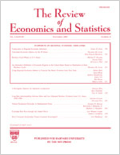
REVIEW OF ECONOMICS AND STATISTICS
Transforming data into impactful economic narratives.REVIEW OF ECONOMICS AND STATISTICS, published by MIT PRESS, stands as a pivotal journal in the fields of economics and econometrics, with origins dating back to 1978. As a high-impact publication with impressive 2023 rankings placing it in the Q1 category for both Economics and Econometrics, and Social Sciences (miscellaneous), it serves as a crucial platform for scholarly discourse. With an E-ISSN of 1530-9142, the journal provides vital insights and analyses that drive contemporary understanding of economic phenomena. Recognized for its rigorous peer-review process and influential research, the REVIEW OF ECONOMICS AND STATISTICS is essential for researchers, professionals, and students aiming to advance their knowledge and contribute to the field. Though it does not currently offer open access, its substantial impact factor and cutting-edge studies ensure that its articles remain indispensable resources for anyone dedicated to the advancement of economic research.
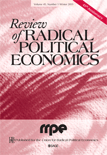
REVIEW OF RADICAL POLITICAL ECONOMICS
Pioneering new approaches to understanding economic systems.REVIEW OF RADICAL POLITICAL ECONOMICS, published by SAGE PUBLICATIONS INC, is a prominent journal dedicated to advancing the discourse on economic theory and political economy. Established in 1969, it has been at the forefront of critical analyses and innovative perspectives, focusing on issues that intersect economics and social philosophy. With an impact factor indicative of its scholarly influence—ranking in the Q2 category in Economics and Econometrics and Q1 in Philosophy—this journal serves as an essential resource for researchers, professionals, and students seeking to explore radical approaches to economic and political systems. Although it is not an open-access publication, the journal offers diverse access options for institutions and individuals committed to deepening their understanding of economic realities. Its reputable standing, bolstered by a strong presence in Scopus rankings—84th percentile in Philosophy and 49th percentile in Economics—demonstrates its contribution to shaping contemporary economic thought and fostering dialogue within the academic community.

Ekonomista
Empowering new voices in the field of economic research.Ekonomista is a distinguished open-access journal dedicated to the field of economics, published by the Polskie Towarzystwo Ekonomiczne. Since its transition to open access in 2022, the journal has enhanced its mission to disseminate high-quality research that serves the academic community and informs policymakers. With an ISSN of 0013-3205 and an E-ISSN of 2299-6184, Ekonomista aims to foster rigorous discussions and innovative perspectives on current economic issues. Although it has experienced lapses in coverage through Scopus, its commitment to advancing knowledge in Economics, particularly in the realms of econometrics and finance, remains steadfast. The journal is indexed within the lower echelons of Scopus rankings, providing an opportunity for new voices in the discipline to emerge and contribute to the ongoing discourse. Positioned at ul. Nowy Swiat 49 in Warszawa, Poland, Ekonomista not only connects researchers and professionals but also serves as an educational resource for students aiming to deepen their understanding of economic theories and practices.
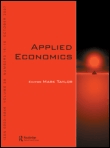
APPLIED ECONOMICS
Unlocking the Potential of Applied Economic ResearchApplied Economics, published by Routledge Journals, Taylor & Francis Ltd, is a revered platform in the field of Economics and Econometrics. Since its inception in 1969, the journal has maintained its commitment to disseminating high-quality research, covering a wide range of topics within applied economics that are critical for understanding and addressing real-world economic issues. With a notable Q2 ranking in Economics and Econometrics and a strong standing in the 67th percentile of Scopus rankings, it serves as an essential resource for researchers, professionals, and students alike, providing insights that bridge theoretical frameworks and practical applications. While the journal is not an Open Access platform, it continues to foster academic discourse and innovation within the economics community, contributing to the ongoing development of evidence-based policies and practices. Its accessibility and robust editorial standards ensure that the latest findings and methodologies reach an engaged audience, further solidifying its reputation as a key publication in the field.
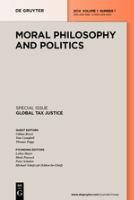
Moral Philosophy and Politics
Elevating Conversations on Morality and GovernanceMoral Philosophy and Politics, published by WALTER DE GRUYTER GMBH, stands as a leading journal in the fields of ethical theory, political philosophy, and the social sciences. With an ISSN of 2194-5616 and an e-ISSN of 2194-5624, this journal provides a vital platform for interdisciplinary dialogue surrounding moral issues and political dynamics, particularly emphasizing the integration of historical philosophy with contemporary social issues. As a Q1 journal in both the History and Philosophy of Science and Philosophy categories for 2023, it demonstrates exceptional academic rigor and impact, solidifying its reputation within the academic community. Additionally, it holds significant rankings in Scopus, including #135 in Arts and Humanities (Philosophy) and #45 in Arts and Humanities (History and Philosophy of Science). The journal, which has been converging insights since its establishment in 2014 and will continue through 2024, is crucial for scholars and practitioners alike, enabling them to explore and contribute to the continuing discourse in moral and political thought. While the journal is not open access, it ensures broad dissemination of knowledge through its publication, affirming its importance as a reference point for ongoing research and philosophical inquiry. Located in Berlin, Germany, the journal addresses a global audience eager to engage with pressing ethical and political questions.

B E Journal of Theoretical Economics
Connecting scholars through rigorous theoretical exploration.The B E Journal of Theoretical Economics, published by WALTER DE GRUYTER GMBH, is a prominent academic journal based in Germany, dedicated to advancing research in the field of theoretical economics. With an ISSN of 2194-6124 and an E-ISSN of 1935-1704, this journal has been a valuable resource for scholars since its inception. Recognized for its contributions to the economics domain, it holds a Q3 ranking in the Economics, Econometrics and Finance category as of 2023, positioning it among noteworthy publications within the discipline. Although the journal operates under a traditional publishing model rather than open access, it remains committed to disseminating high-quality theoretical research and fostering scholarly discussions that bridge various economic theories and applications. Researchers, professionals, and students looking to deepen their understanding of economic theory will find a wealth of insights and innovative perspectives within the journal's pages, which have been published with a focus on evolving theoretical frameworks from 2001 to 2003 and again since 2007 through 2024.

ECONOMETRICA
Fostering intellectual discourse in econometrics.ECONOMETRICA, published by Wiley, is a leading journal in the field of economics and econometrics, renowned for its rigorous and cutting-edge research contributions. With an ISSN of 0012-9682 and an E-ISSN of 1468-0262, this esteemed journal holds a prestigious position in the academic landscape, classified in the top quartile (Q1) for both Economics and Econometrics as of 2023, and ranked 42 out of 716 in its field, placing it in the 94th percentile according to Scopus metrics. The journal's scope encompasses a diverse range of topics aimed at advancing economic theory and its practical applications, making it an essential resource for scholars, practitioners, and students alike. Although it operates under a subscription model, the depth and quality of research published in ECONOMETRICA underscore its significance as a cornerstone for intellectual discourse and innovation within the field. Based in the United Kingdom, at 111 River St, Hoboken, NJ 07030-5774, ECONOMETRICA continues to attract high-caliber contributions that shape the future of econometric research.
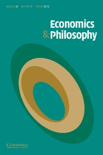
ECONOMICS AND PHILOSOPHY
Bridging Theory and Thought.ECONOMICS AND PHILOSOPHY is a distinguished journal published by Cambridge University Press, dedicated to the interdisciplinary study that bridges the gap between economic theories and philosophical discourse. With an ISSN of 0266-2671 and an E-ISSN of 1474-0028, this journal has been a critical resource for scholars since its inception in 1985, evolving continually to encompass contemporary issues and methodologies through to 2024. The journal holds a Q3 ranking in Economics and Econometrics and an impressive Q1 ranking in Philosophy for 2023, as per its category quartiles. Additionally, it ranks 123 out of 806 in the Arts and Humanities – Philosophy category, reflecting its high impact within the philosophical community. While it does not currently offer open access, the journal remains an essential platform for researchers, professionals, and students who seek to delve into the philosophical implications of economic thought and practice. In an era where economic decisions profoundly influence global society, ECONOMICS AND PHILOSOPHY plays a vital role in fostering critical dialogue and advancing scholarly insight.
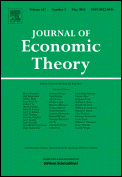
JOURNAL OF ECONOMIC THEORY
Connecting Scholars through Economic InnovationThe JOURNAL OF ECONOMIC THEORY, published by Academic Press Inc Elsevier Science, stands as a paramount platform for disseminating groundbreaking research within the field of economics and econometrics. With an impressive history dating back to 1969 and a convergence period extending to 2024, this journal has continually shaped the academic discourse around critical economic theories and methodologies. Currently recognized in the top quartile (Q1) of its category for 2023, it ranks prominently among its peers, boasting an impactful scholarly contribution reflected in its Scopus ranking—positioned at #348 out of 716 journals in the domain. Although it does not offer Open Access, the journal provides an essential resource for those seeking to enhance their understanding of complex economic models and strategies. Researchers, professionals, and students alike will find the JOURNAL OF ECONOMIC THEORY to be an invaluable asset for their academic and professional pursuits in the rapidly evolving landscape of economics.